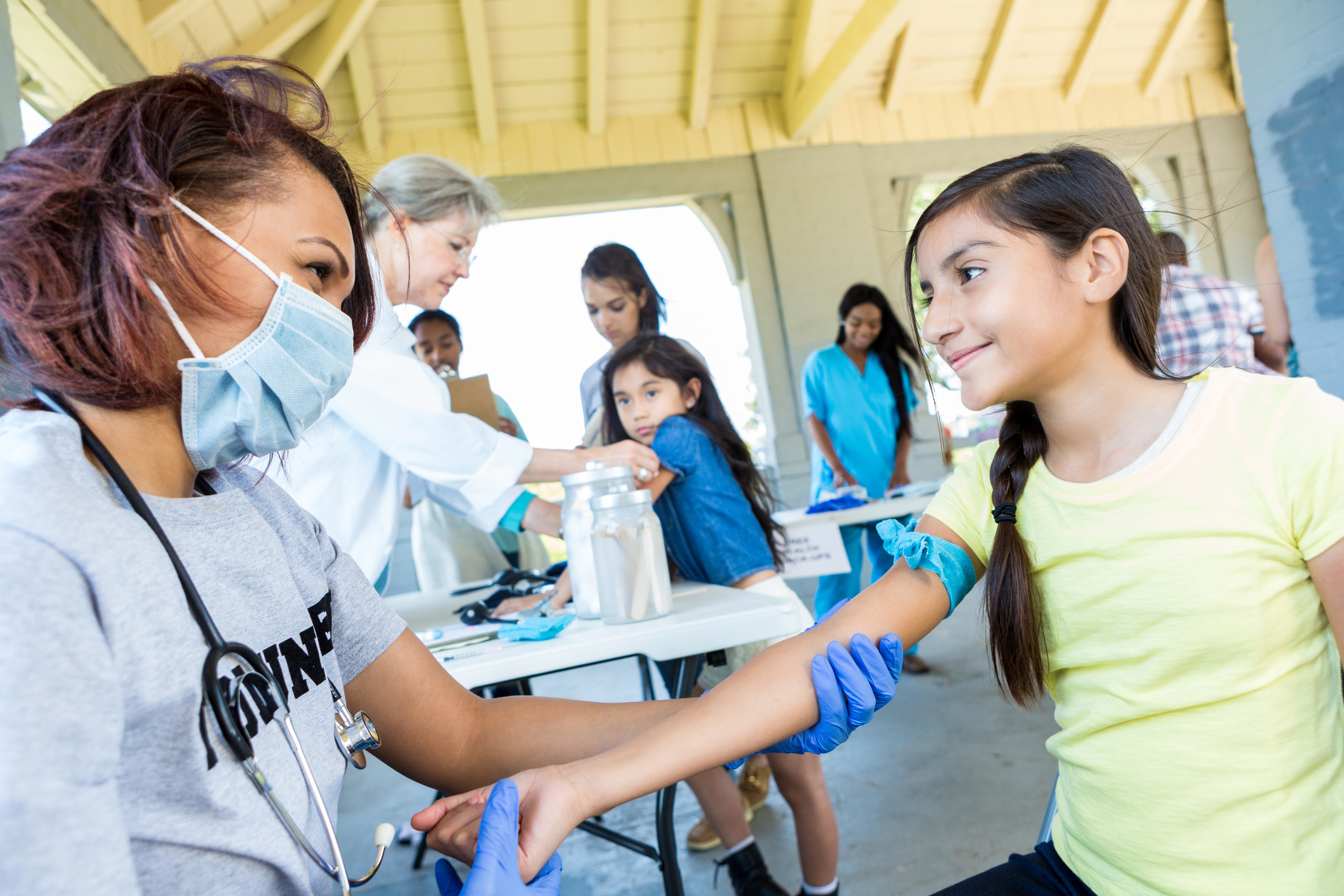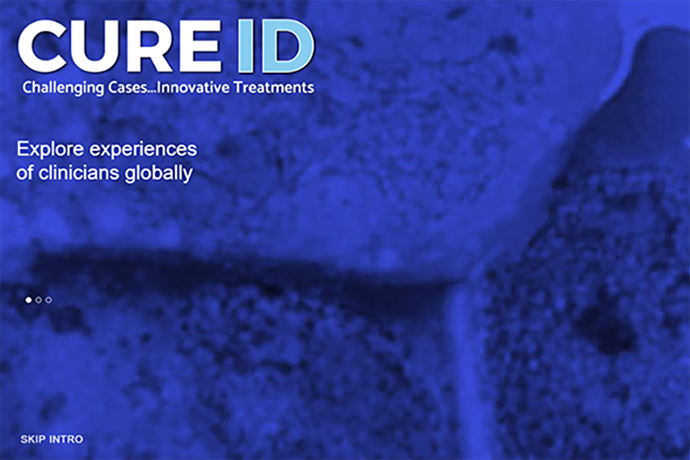Collaboration Speeds COVID-19 Research
By bringing together experts with complementary skills, knowledge and experience, we help projects cut through operational roadblocks to contribute to new knowledge about COVID‑19 and the virus that causes it.
Collaboration Speeds COVID-19 Research
Connecting Researchers with School and Community Leaders to Guide Safer Returns to the Classroom
A key question during the COVID-19 pandemic on the minds of parents, teachers, staff and students is how to hold in-person classes safely. The ABC Science Collaborative — a project established in July 2020 that received early funding from our Clinical and Translational Science Awards (CTSA) Program — connects researchers and physicians with school and community leaders to aid in sharing and understanding the most relevant COVID-19 information based on data from their own communities. With assistance from the CTSA Program Trial Innovation Network, this project now extends across 13 states and has received additional funding through the Safe Return to School Diagnostic Testing Initiative, part of the Rapid Acceleration of Diagnostics-Underserved Populations (RADx-UP) program. Building on results from their earlier study, the ABC Science Collaborative researchers looked at SARS-CoV-2 transmission among more than 1 million students and staff members in North Carolina public and charter schools from March to June 2021. Preliminary results reported in August 2021 indicate universal masking contributed to low transmission rates.
Learn more about the ABC Science Collaborative and its resources.
Building on Community Relationships to Increase Participation by Underserved and Vulnerable Populations in Research

Girl participating in a community engagement health fair. (Getty Images)
Communities of color account for more than half of all reported COVID‑19 cases in the United States. The Clinical and Translational Science Awards (CTSA) Program institutions, which have built trusting relationships with these communities through inclusion and sharing study outcomes, pivoted rapidly to support two NIH initiatives focused on addressing health disparities exacerbated by COVID‑19. The NIH Community Engagement Alliance (CEAL) Against COVID‑19 Disparities is leveraging CTSA Program community engagement resources to promote and facilitate the participation of underrepresented communities in COVID‑19 clinical trials and help strengthen vaccine confidence and access. Similarly, the Rapid Acceleration of Diagnostics for Underserved Populations (RADx-UP) program is utilizing CTSA Program Community and Collaboration Cores to connect researchers and trainees with community-engaged research activities. Learn more about our role in community engagement during the pandemic.
Patient Perspective Aids Understanding of COVID‑19 and Rare Diseases
Our Rare Diseases Clinical Research Network (RDCRN) consists of 20 collaborative clinical research teams that partner with patient groups to study how rare diseases progress and to develop better ways to diagnose and treat them. Through this close partnership, RDCRN researchers and clinicians recognized early in the pandemic that many people with rare diseases faced new challenges from COVID‑19, from reduced access to needed medical care to possible heightened anxiety and stress. In May 2020, they launched an online survey to find out how the COVID‑19 pandemic was impacting individuals with rare diseases, their families and their caregivers. Findings from the survey will help researchers shed light on the needs of people with rare diseases during the COVID‑19 pandemic and other potential health crises, in addition to informing future research efforts.
See preliminary survey results released in February 2021.
Leveraging Existing Partnerships to Build a National Data Analytics Platform

Vast amounts of data are being produced that could help advance COVID-19 research efforts, but they often become too large to share or cannot be combined easily. Making data more meaningful, open and accessible is a key goal in our efforts to improve translational science and advance research across many diseases. In March 2020, in partnership with the Clinical and Translational Science Awards (CTSA) Program institutions and the National Center for Data to Health (CD2H), we launched an effort to create a centralized national data resource for studying COVID-19 and identifying potential treatments. The National COVID Cohort Collaborative, or N3C, systematically collects clinical, laboratory and diagnostic data from different sources and harmonizes it. Researchers can access the N3C Data Enclave, which includes billions of rows of data, to explore a range of research questions about COVID-19 and clinical care. If successful, this approach may help answer other research questions and serve as a model for addressing future public health emergencies.
Learn more about the N3C and applying for data access.
Partnering With Industry to Speed the Development of Promising Treatments
When the COVID-19 pandemic began, no approved therapeutics or vaccines were available to counteract SARS-CoV-2. NIH responded swiftly with the Accelerating COVID‑19 Therapeutic Interventions and Vaccines (ACTIV) initiative, a public-private partnership to coordinate the development of the most promising treatments and vaccines. Alongside industry partners, we have a lead role in a range of ACTIV efforts. In November 2020, the ACTIV Preclinical Working Group published two papers offering new tools to speed drug discovery and testing. In the first paper, researchers provide a blueprint for rethinking the traditional sequential drug development approach. The second paper summarizes the latest guidance and insights on animal models for preclinical testing of COVID-19 vaccines and therapeutics. The review complements animal model data that are updated regularly by the working group and researchers on the NCATS OpenData Portal. In addition, we are coordinating and overseeing two ACTIV Phase 3 clinical trials.
Learn more about the ACTIV-1 and ACTIV-6 clinical trials.
Forming New Collaborations to Jump-Start and Optimize Studies
Our scientists focus on overcoming bottlenecks in the research process. They help collaborators do this, too. A prime example is the NIH serosurvey study to quantify the number of undetected, or asymptomatic, coronavirus cases early in the pandemic. Our translational scientist Matt Hall, Ph.D., helped pull together a collaborative team from across NIH that began recruiting participants in April 2020. Our role included optimizing both the test to analyze the blood samples and the data collection efforts through a new data dashboard and recruiting participants through the Clinical and Translational Science Awards (CTSA) Program. The study estimated nearly 17 million undiagnosed cases — in addition to 3 million known cases — in the United States by mid-July 2020. A longitudinal study will re-sample study participants every 6 months to provide insights on antibody levels post-infection and post-vaccination.
Read the June 2021 news story about the serosurvey study.
Harnessing the Power of Crowdsourcing to Share Novel Uses for Repurposed Drugs

Developed in 2013, CURE ID is an internet-based repository that provides licensed clinicians with the opportunity to report novel uses of existing drugs for difficult-to-treat infectious diseases.
Created through our partnership with the U.S. Food and Drug Administration (FDA), CURE ID allows the crowdsourcing of medical information from health care professionals to facilitate the development of new treatments using existing drugs for difficult-to-treat infectious diseases. CURE ID was updated in June 2020 to boost the platform’s usefulness for addressing the COVID-19 pandemic. The app, which was developed with our support, includes updated information on most clinical trials submitted to clinicaltrials.gov for COVID-19 drugs, biologics and vaccines, along with relevant journal articles, news articles and more. Building off the CURE ID platform, the Critical Path Institute launched the CURE Drug Repurposing Collaboratory (CDRC), a public-private partnership funded by the FDA, in collaboration with NCATS, to speed up the identification of effective treatments and further drug development. The CDRC will demonstrate how data shared from clinicians in real-time can be used to inform ongoing and future clinical trials and potentially drug labeling.
Health care professionals can register to use the CureID app.
I Am Translational Science: Hongfang Liu, Ph.D.
Hongfang Liu, Ph.D., program director for informatics at Mayo Clinic, explains how collaborating with experts in other disciplines to build the N3C Data Enclave will advance the science behind COVID‑19.
NIH Serosurvey to Measure Undetected COVID-19 Cases
This video shows how the NIH study to measure undetected COVID‑19 cases came together.
A version of this video with audio description is available.


